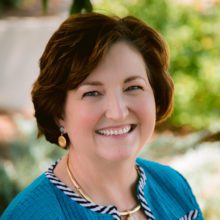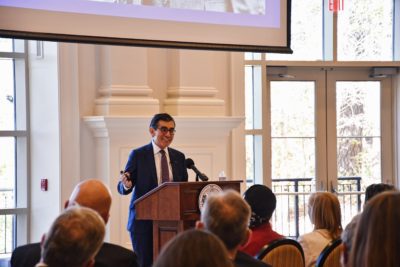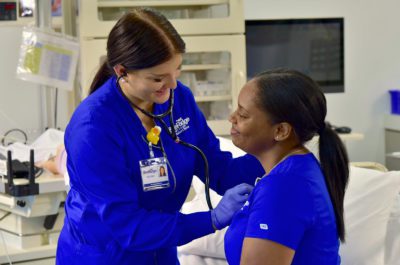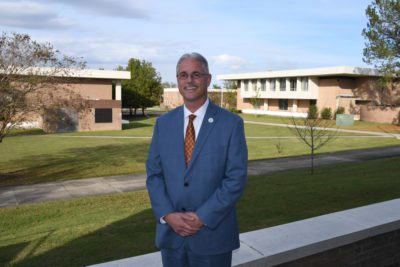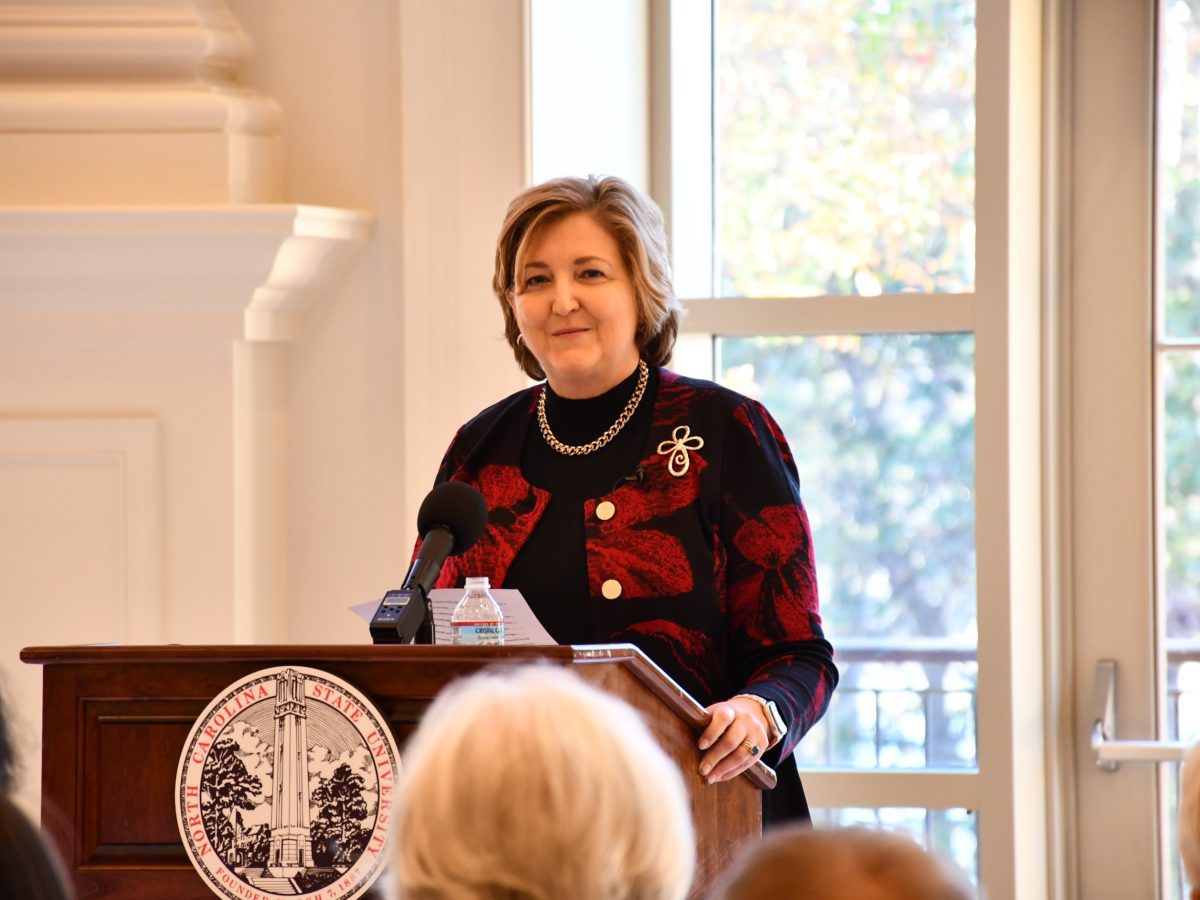

|
|
The following are remarks as written for delivery for the Nov. 8, 2022 Dallas Herring Lecture response.
Good afternoon, my name is Janet Spriggs, and it is my great privilege and honor to serve as President of Forsyth Technical Community College in Winston-Salem.
Thank you, Dr. Flores, for sharing such important insight and your invaluable experiences, but more importantly, thank you for sharing your heart so eloquently. It is one thing to listen to someone talk about compelling data and statistics, it is infinitely more powerful to listen to someone weave stories, sharing their life’s purpose with such fervor.
I was surprised and honored when I was asked to deliver the response for the Dallas Herring Lecture this year, and I am deeply grateful to AJ and the Belk Center for the invitation. But now, it is my responsibility to follow you Dr. Flores, and I’m not sure why I thought this was a good idea. However, I will do my best.
I have structured my remarks around three imperatives from this lecture that clearly demonstrate why community colleges are the most powerful weapon for our nation to substantially advance equity, enhance social mobility, and ultimately, make significant progress in our fight against poverty. Each of these are calls to action imploring us to courageously challenge the status quo, because doing the same things we have always done is not enough.
First, community colleges must embrace partnerships like never before. Second, community colleges must renew and intensify scalable reforms to eliminate inequities. And third, community colleges must get to know and love the students we have, and serve each and every student to success, especially the marginalized members of our communities who need us the most.
Embracing partnerships
In his lecture, Dr. Flores suggests, “Across the nation, community colleges are community’s best economic development strategy.” I could not agree more. We heard about the goals for increasing postsecondary degree completion set by “Building a Talent Strong Texas,” and in North Carolina, we are grateful for the cross-sector work on educational attainment led by MyFutureNC. MyFutureNC was created to help us grow our state’s economic viability within the global economy by closing postsecondary attainment gaps, promoting alignment between educational programming and industry needs, and improving the quality of educational opportunities for all North Carolinians.
More people with higher levels of educational attainment will create a skilled pipeline of workers to meet workforce needs and address workforce gaps. Community colleges are often driving this work, but we will not succeed alone. To be successful, we must embrace partnerships in ways that we have not yet imagined.
Throughout his lecture, Dr. Flores shared stories about some of Alamo’s critical relationships. He talked about partnering with city and county governments, private agencies, and industry leaders, and he compelled us to understand the importance of colleges partnering with each other. Numerous studies place community colleges at the center of successful economic and workforce development. Due to extraordinary post-COVID workforce gaps, it is even more critical for us to be actively leading workforce development.
A 2016 study by the Brookings Institute concluded, “states that fail to align their community college goals with economic development efforts to address their human capital challenges run the risk of losing out in the competition for good jobs and sustainable development.” It is not coincidence that North Carolina, recently named the No. 1 state in the country for business, also has one of the most affordable, highest quality, workforce-focused community college systems in the country. The same Brookings study challenged regions and states to gain a competitive advantage by working collaboratively to produce workers with skills that match industry needs, declaring, “more than ever, the status quo is not a viable option.”
In North Carolina, we are already reimagining how to work more closely with each other and with key partners. Piedmont Community College worked with Person County officials to create the 6-14 Workforce Pipeline Partnership to address workforce pipeline leaks. Piedmont’s President, Dr. Pamela Senagal, told me “6-14 represents partnership at its best.” County commissioners, industry, public schools, and the college came to the table, and educational partners worked to align courses and programs to correlate with the region’s economic development focus areas.
Beginning in sixth grade, public school students take a career exploration course tied to the region’s economic development focus area and incorporating hands-on activities and industry site visits. Then, students narrow their focus to a CCP career pathway at Piedmont. Work-based learning experiences are now embedded in every degree and continuing education program with 96 or more hours. Seventy-five percent of students participating in work-based learning are being offered full-time employment when they graduate. Piedmont went from internships at less than a dozen businesses to now more than 50.
Another example is a statewide coalition of public and private partner organizations and educational institutions, led by the North Carolina Biotechnology Center. This consortium received nearly $25 million from the U.S. Economic Development Administration’s Build Back Better Regional Challenge. Ten community colleges, along with our state’s Historically Black Colleges and Universities, the University of North Carolina at Pembroke, which is our only Historically American Indian University, the NC Biotech Center, and a host of key industry partners are collaborating in this unique project to strengthen North Carolina’s life sciences manufacturing cluster. Together, this work will impact 79 counties by expanding, connecting, and promoting training and career opportunities to underserved and distressed communities, including historically excluded populations.
This example also represents partnership at its best, but much more is needed. We have weathered the heartbreaking realities of a deadly global pandemic, but the impacts of the past few years are still evolving. Our students, communities, businesses, and the economic prosperity of our great state cannot afford for us to wait for partners to come to us. I implore us to seize the opportunity to lead because this is our time.
Community colleges are in the best position to lead partnerships to advance economic mobility and viability. We cannot be afraid to challenge the status quo, take strategic risks, create more innovative partnerships, and empower and uplift more students and more communities.
Scalable reforms to eliminate inequities
My second call to action: community colleges must renew and intensify scalable reforms that narrow and eliminate inequities. We must prioritize support systems for the most marginalized members of our communities, those who need us the most. Throughout his lecture, Dr. Flores shared examples of the critical work in Texas, speaking with passion about the Alamo’s moonshot — eliminating poverty through education while empowering diverse communities for success.
At Forsyth Tech, we are also taking on poverty. Our vision is to be “a catalyst for equitable economic mobility, empowering lives and transforming communities.” George Washington Carver said, “Education is the key that unlocks the golden door to freedom.” However, because of inequities in education, the golden door to freedom is not available in equal measure for all students.
Scalable reforms link very closely to partnerships, and at Forsyth Tech, we are committed to leading this work by building partnerships and programs that level the playing field. Programs like College Lift, which works in the most socioeconomically disadvantaged area of our community to provide rigorous academic and social support for low-income, disadvantaged students from 6th through 12th grades, setting up postsecondary educational attainment as an expectation for students, not an unattainable dream.
Every Saturday during the school year, we welcome these College Lift scholars to Forsyth Tech, providing them with supplemental classes in Math, English and other key subjects. When they reach high school, we enroll them in a dual credit pathway. We partner with four-year universities so all College Lift scholars who complete the program and graduate high school, receive scholarships to attend college from Forsyth Tech or one of our four-year partners. We also require their parents or guardians to attend workshops to prepare them to better support their scholars, and we focus on intergenerational poverty by providing those adults with programming through human resource development and workforce programs to prepare them for higher-skilled jobs. Cecilia, a single, working mother who has a daughter in this program told us about the impact the program has had on her daughter, who dreams of being a lawyer. She said since becoming a College Lift scholar, her daughter, “feels better, is a better student and person, by knowing with her effort, and the help of this program, she will accomplish her dreams of a career and to have a better life.”
No one has greater access to low-income and marginalized communities than us. No one has more opportunity to build coalitions that empower people and transform communities than us. No one is better prepared to build bridges out of poverty than us. I challenge us all to challenge the status quo and fearlessly address the systemic inequities that exist in our communities and lead the work to eradicate them.
Love and serve each and every student to success
Finally, my last call to action: community colleges must take the time to know and love the students we have, and serve each and every student to success, especially the marginalized members of our communities. Dr. Flores talked about the beautiful diversity of community college students, sharing student stories to illustrate the diverse struggles students face and demonstrating why holistic supports are critical to mitigate the unique barriers facing our students.
As I listened to his stories, I thought about my students — Mallory, LaShawnna, Jess, and Mario — and many more from the past 26 years. Each of them crossed my path because they wanted a better tomorrow, even though they faced significant barriers threatening their ability to reach their American dream. Mallory was a low-income, first-generation, adult learner who graduated from Forsyth Tech in 2019 with an associate degree, but who almost dropped out because of a $750 car repair bill. We intervened to help with the bill, and she has now completed her bachelor’s and master’s degrees and is working as a genetics counseling assistant at Novant Health.
LaShawnna works far more than 40 hours per week and has worked on her business administration degree for more than a decade to help her move to a higher paying career. LaShawnna had to drop out several times, putting herself and her education on hold for her family. Thanks to our NC Reconnect work, LaShawnna re-enrolled this fall, earning a solid B in her first eight-week class. She has three more classes and will graduate next May.
Jess, a single mom in her mid-30s, is a student ambassador actively engaged in the Student Government Association (SGA). A couple of years ago, she was diagnosed with MS. She lost her job, and said she felt like her life was over, until she found Forsyth Tech. Today, she can’t wait to graduate, and her goal is to work at Forsyth Tech. I can’t tell you how heartwarming it is to hear her share her story; she always ends with, “Forsyth Tech saved my life.”
Mario was our SGA president last year. He and his family ended up in North Carolina after being granted political asylum when they were forced to flee for their very lives from Venezuela as hyperinflation and human rights violations escalated. Mario is an incredible young man who brought me to tears at commencement in May when he told his fellow graduates, “When I came here from Venezuela, I was not sure what my path to an education would look like, but I was determined to find my way. In my time here, I have learned that education has the power to transform not just the life of the person receiving the education, but all the lives of those around them. I hope you have learned during your time at Forsyth Tech that you can be whatever you want to be, do whatever you want to do, and that your future is limitless.” And now Mario is a Goodnight Scholar right here at NC State University, and I am honored to have him join us here today. Mario, will you please stand?
All our student stories are remarkable examples of community college students succeeding even though they faced significant challenges. As open-door institutions, we must be student-ready colleges, able to meet our students wherever they are rather than expecting them to fit within a traditional college-ready paradigm.
I like the Alamo Colleges declaration that “nontraditional students are no longer nontraditional,” they are simply our students, and we must center student success reforms to diminish the difficult challenges our students face, by being ready to meet them where they are, not where we expect them to be. In the classroom, we must provide the highest quality, most engaging and culturally responsive teaching possible. At Forsyth Tech, we invest time and financial resources in helping our teachers teach better, intentionally building accountability for 20 hours of professional development per year that we pay for, into every faculty role and establishing the faculty as a vital link for students to nonacademic services.
Outside the classroom, we must connect students to holistic support services, both internally and through services from collaborations with external partners. We support students’ nonacademic needs through Forsyth Tech Cares, a network of resources that help students when life happens barriers get in their way. Some of our Cares resources are internal, like counseling, or targeted services through our Women’s Center, Veterans Center, our Minority Male Success Initiative, TRIO, our NC Reconnect Adult Learner Retention services, or emergency funds from our foundation. But a growing number of our Cares resources are collaborations with external partners, like student legal services thanks to the Wake Forest University School of Law and our seven Connect Resource Pantries thanks to our Second Harvest Food Bank and Kate B. Reynolds Charitable Trust partners.
J. B. Buxton, president at Durham Technical Community College is challenging the status quo with the college’s plans to build an affordable housing complex adjacent to their campus to support the college’s long-term work aimed at improving housing security for students and advancing the college’s equity-minded leadership within their community. The college has secured most of the funding for this bold project and when completed, twenty-five percent of the units will be reserved for Durham Tech students who have children or who have been in foster care and the remainder will be for residents living 20 to 60 percent below the poverty line.
These are examples of how colleges work to know and understand their students and embrace the call to meet students where they are. But these stories must be just the beginning, serving as models that call us to far greater action.
I will share one final story today, about a little girl who grew up in a small farming community in North Carolina, in the 1960s and 1970s. She lived in a mobile home with her parents and her two baby brothers, encircled by the unconditional love of a large extended family.
This little girl loved to read, and her books became her window to the world and the foundation for her dreams. When she entered eighth grade, she moved to a school 20 minutes away in the larger town, and for the first time, she realized she was different from many of her new friends. She realized she was poor. This is when she felt “less than” for the first time.
She started to feel like no matter how hard she worked or how smart she was, the deck was already stacked against her, and her lot in life had been cast. She had long dreamed of going to college, and her parents would sacrifice endlessly to see their little girl soar, but neither of them had graduated high school, and her hardworking family had little money to spare. She resigned herself to the fact that her books might be the only window she would ever have into the world of her dreams.
Fortunately, however, the girl in this story had people in her life who cared enough about her to not let her dreams die. Today, she does not live in poverty. Thanks to a lot of people who loved her, she did go to college, including two of North Carolina’s Great 58 community colleges. It took her a bit longer to earn her first degree than many traditional college students, but she persevered, overcoming much to eventually be the first person in her family to earn a college degree, but she was certainly not the last. Today, she will tell you she was prouder of her baby brother and her children earning their degrees than she is of any of her own accomplishments.
Today, the little girl from my final story is living her dreams and her purpose with passion every day. Today, she is a community college president, privileged to serve the state she loves so dearly and more importantly, honored to have the opportunity to love and serve each and every student who attends her institution to success, working hard alongside a college full of trailblazers to make sure none of their students ever feel less than, instead making sure they know without a doubt, they are where they belong and supporting what every learner needs to be successful. And today, that little girl is grateful beyond measure to be the woman standing before you and delivering the response to the 2022 Dallas Herring Lecture.
I hope my story serves as an exemplar; a personal example of the power of education to transform not just one life, but generations of lives.
Our purpose is as clear today as it was decades ago when Dr. Dallas Herring boldly declared, “The only valid philosophy for North Carolina is the philosophy of total education.” Dr. Herring’s call for North Carolina’s community colleges to “meet students where they are and take them as far as they can go,” endures today as the singularly most important call to action for equity and economic mobility in North Carolina within our lifetime. As Dr. Flores said, “the common thread among all of our students is they want better lives for themselves and their families. Better lives that we as community college leaders can help provide.” Better lives for the more than 500,000 graduates of the Great 58 in 2021; better lives for students just like Markisha, Nathaniel, Jaeden, and Destinnee in Texas, and Mallory, LaShawnna, Jess and Mario in North Carolina; better lives for North Carolinians just like me.
Thank you for your time and attention. I am more convinced than ever that our time is now — and now is the best time for community colleges to courageously challenge the status quo and lead the work of creating a more equitable future for every North Carolinian.
